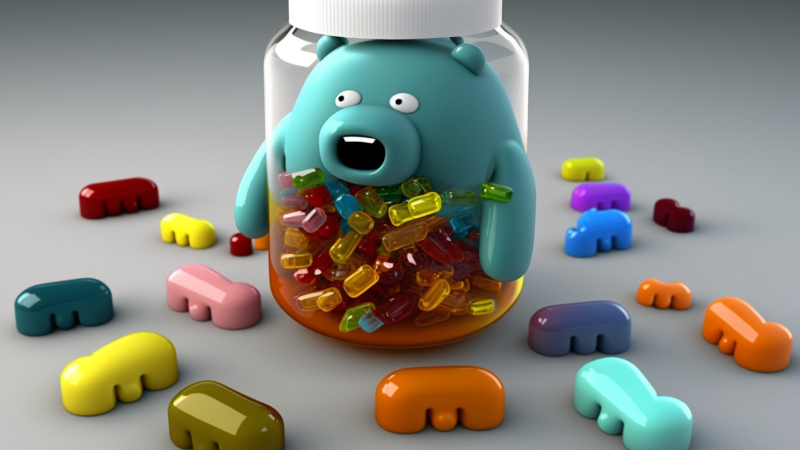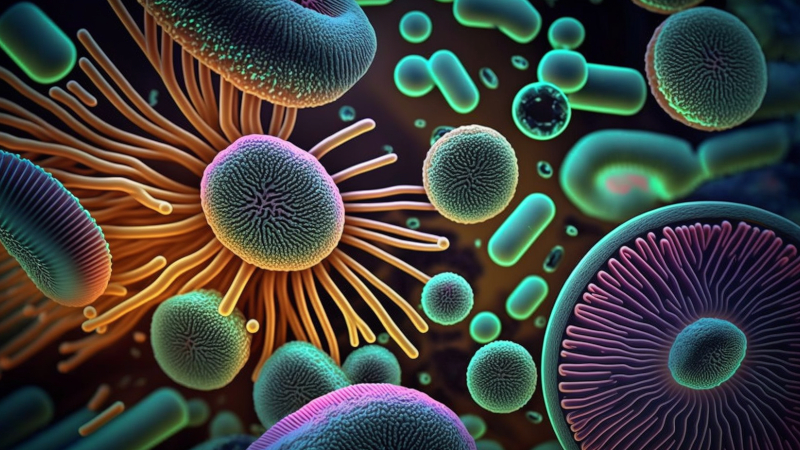SIBO, or Small Intestinal Bacterial Overgrowth, is a condition where the bacteria in the small intestine become imbalanced, leading to various symptoms and discomfort. When treating SIBO, a common phenomenon known as ‘SIBO die off symptoms’ may occur.
In this article, we will discuss these symptoms, their causes, common myths, and practical tips to help manage and prevent them.
Table of Contents
SIBO Die Off Symptoms Explained
When treating SIBO, whether through herbal or conventional antibiotics, die-off symptoms may occur as the harmful bacteria in the small intestine are being killed.
Die-off, also known as the Jarisch-Herxheimer reaction, is characterised by the release of toxins and proteins from the dying bacteria, which can overwhelm the body and lead to a robust inflammatory response. 1
The common symptoms of SIBO die off include:
- Fever
- Chills
- Fatigue
- Malaise
- Muscle aches
- Skin rashes
- Brain fog
- Headaches, and
- Worsened SIBO symptoms such as:
- Abdominal pain
- Bloating
- Diarrhea, and
- Constipation.
What Causes SIBO Die Off?
SIBO die-off occurs when the overgrown parasites, fungi, and more commonly bacteria in the gut are killed rapidly, and the liver and kidneys struggle to remove the toxins at the same rate. 2
Die-off is usually triggered by strong treatments such as prescribed antibiotics, antifungals, or significant dietary changes like a low FODMAP or Elemental diet that effectively starve or kill the harmful gut organisms.

Methane SIBO Die Off Symptoms
One type of SIBO which is encountered more commonly is Methane SIBO. This is a type of SIBO characterised by an overgrowth of methane-producing bacteria. 3
The die-off symptoms for methane SIBO are generally similar to those for other types of SIBO but can include additional gas-related symptoms such as increased flatulence and belching.
These methane-specific symptoms result from the rapid breakdown of methane-producing bacteria and the release of methane gas as a byproduct.
SIBO Die-Off Symptoms: Debunking Common Myths
There are several misconceptions surrounding SIBO die-off symptoms, and it’s essential to clarify these misunderstandings for a better comprehension of the actual die-off reactions.
Myth 1
Die off is triggered by a minor change in diet or the introduction of a new supplement
The truth is that die off results from a substantial alteration in gut flora, leading to the mass elimination of harmful bacteria. A slight or minor change in diet or adding a supplement is not likely to provoke such a response.
Myth 2
Die off persists for weeks or even months
In reality, it is a temporary condition that normally resolves itself within a week or so after the body has dealt with the initial die-off.
Myth 3
Die off arises months into a new treatment plan
Contrary to this belief, die off usually takes place within a week of initiating a new antibiotic or making a significant dietary modification, not months later.
Myth 4
Die off occurs repeatedly
Die off is a unique reaction and is not something that continues in perpetuity. If symptoms keep reappearing, it may indicate insufficient treatment or recurrent infections.
When do SIBO Die Off Symptoms Start?
SIBO die off symptoms usually begin within a few days to a week after starting a new treatment or making a significant dietary change. Remember, this is usually something big, not a minor change.
This timeline may vary depending on the individual and the specifics of their treatment regimen.

How Long do SIBO Die Off Symptoms Last?
As touched upon earlier, SIBO die off symptoms typically last for a few days to a week but can sometimes persist for longer periods.
The duration of symptoms depends on factors such as the severity of the SIBO overgrowth, the strength of the treatment, and the individual’s overall health.
9 Tips to Prevent SIBO Die Off
To help minimise or prevent SIBO die off symptoms, consider the following strategies:
- Stay hydrated
- Drink fluids every hour, including mineral or alkaline water, to help flush out toxins. 4
- Get adequate rest
- Aim for at least 8 hours of sleep per night, as deep and restoring sleep helps to naturally decrease cytokine production. If needed, consider including meditation or hypnosis into your routine to help you sleep better.
- Consume antioxidant-rich foods or supplements
- Use digestive enzymes
- Pancreatic enzymes may help clear the intestines of undigested food which feed yeast and bacteria.
- Soak in Epsom salt baths or use a sauna
- These activities can help detoxify the body and relax muscles.
- Talk to your healthcare provider
- Discuss potentially lowering the dose of your antibiotic medication and antifungal treatments to help manage symptoms.
- Ensure regular bowel movements
- This can help with purging and expelling toxins and metabolic waste associated with die-off. Gentle ways to relieve constipation include Epsom salt baths, magnesium supplements, and proper hydration.
- Keep a symptom journal
- Tracking changes in your SIBO treatment regimen and new symptoms can help you identify potential die-off triggers and distinguish die-off from other causes of discomfort.
- Practice stress management
- High stress levels can exacerbate inflammation, so incorporating stress-reducing techniques like meditation, deep breathing, or gentle exercise can be helpful.
FAQs
What does SIBO poop look like?
When experiencing SIBO die off symptoms, the appearance of your stool may change due to the body’s response to the dying bacteria.
SIBO die off stool can vary, but it is often characterised by loose or watery stools, changes in color, and a strong, unpleasant odor. Keep in mind that stool appearance can be influenced by various factors, including diet and overall gut health.
What does SIBO poop smell like?
SIBO die-off symptoms can vary depending on the type of bacterial overgrowth, and this includes the smell of the stool. Methane SIBO die-off symptoms can lead to constipation and stools with a distinct odor, often described as foul-smelling.
On the other hand, hydrogen sulfide-producing bacteria can result in a stool odor similar to rotten eggs.
It’s essential to recognise that the smell of your stool may change as your body addresses the bacterial overgrowth and die-off occurs. Working with a healthcare professional to manage SIBO can help alleviate these symptoms and improve overall gut health.
Does SIBO cause Stomach Gurgling?
Yes, SIBO can cause stomach gurgling as one of its many symptoms. The presence of excess bacteria in the small intestine can lead to gas production, bloating, and stomach gurgling.
SIBO die-off symptoms may include a temporary increase in these symptoms as the body eliminates the overgrown bacteria. Working with a healthcare professional to develop an appropriate treatment plan can help address these symptoms and improve gut health.
Can you starve SIBO out?
While it’s not possible to entirely starve SIBO out, you can help reduce SIBO die-off symptoms and bacterial overgrowth by following a targeted diet that limits specific foods. These foods to avoid include high FODMAP foods, sugars, and other fermentable carbohydrates, as they can exacerbate symptoms and provide fuel for the overgrowth of bacteria.
A well-planned diet, combined with appropriate medical treatments, can aid in managing SIBO and alleviating related symptoms. It’s crucial to work with a healthcare professional to develop a personalised approach for addressing SIBO.
Do bacteria release gas when they die?
Yes, when bacteria die, they can release gas and other substances as they break down. This process can contribute to SIBO die-off symptoms, which include gas production, bloating, and stomach discomfort.
As the body eliminates the overgrown bacteria during treatment, these symptoms may temporarily intensify before ultimately improving. Consulting a healthcare professional for proper management of SIBO can help minimise these symptoms and support overall gut health.
Conclusion
Understanding SIBO die off symptoms and their causes is essential for those undergoing treatment for SIBO. By recognising common myths and learning practical tips for preventing and managing these symptoms, individuals can increase their chances of a successful recovery.
Always consult with your healthcare provider to discuss your specific situation and create a personalised treatment plan that works best for you.
Share your thoughts on the topic of SIBO die off symptoms and any tips you have that might help others in the comments on Instagram or Pinterest.
References
- “Jarisch Herxheimer Reaction” – A. Dhakal, E. Sbar, 28 April 2022 [PubMed] [Archive] ↩︎
- “Small intestinal bacterial overgrowth and nonalcoholic fatty liver disease” – M. Augustyn, I. Grys, M. Kukla, 20 February 2019 [PubMed] [Archive] ↩︎
- “Methane positive small intestinal bacterial overgrowth in inflammatory bowel disease and irritable bowel syndrome: A systematic review and meta-analysis” – A. Gandhi, A. Shah, M. P. Jones, N. Koloski, N. J. Talley, M. Morrison, G. Holtmann, 30 June 2021 [PubMed] [Archive] ↩︎
- “Water consumption and prevalence of irritable bowel syndrome among adults” – A. Salari-Moghaddam, A. H. Keshteli, A. Esmaillzadeh, P. Adibi, 24 January 2020 [PubMed] [Archive] ↩︎
- “SIBO and Anti-Inflammatories Boswellia & Curcumin” – A. Rinde, 1 June 2022 [Natural Medicine Journal] [Archive] ↩︎
- “Small Intestinal Bacterial Overgrowth in Subclinical Hypothyroidism of Pregnant Women” – B. Wang, Y. Xu, X. Hou, J. Li, Y. Cai, Y. Hao, Q. Ouyang, B. Wu, Z. Sun, M. Zhang and Y. Ban, 24 May 2021 [Frontiers in Science] [Archive] ↩︎
- “The Role of Leaky Gut in Nonalcoholic Fatty Liver Disease: A Novel Therapeutic Target” – T. Kessoku, T. Kobayashi, K. Tanaka, A. Yamamoto, K. Takahashi, M. Iwaki, A. Ozaki, Y. Kasai, A. Nogami, Y. Honda, Y. Ogawa, S. Kato, K. Imajo, T. Higurashi, K. Hosono, M. Yoneda, H. Usuda, K. Wada, S. Saito, A. Nakajima., 28 June 2021 [MDPI] [Archive] ↩︎
Last Updated on 2 months by D&C Editorial Team


